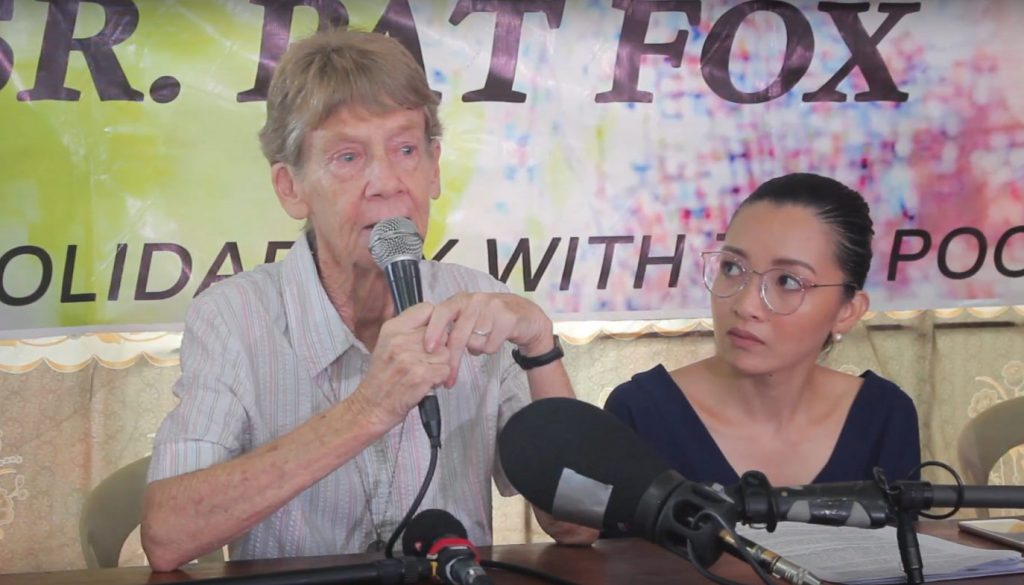MANILA, Philippines (ViaNews) - For over a month now, the Philippine government has been on an all-out offensive campaign to deport an Australian missionary nun who has been in the country for nearly three decades.
The soft-spoken and gentle Sister Patricia Anne Fox, who has always been tirelessly and quietly working in the periphery, is now pushed to the limelight by no less than Philippine President Rodrigo Duterte himself. Duterte admitted, two days after the nun’s arrest, that it was he himself who ordered for her deportation due to her “disorderly conduct” and “foul mouth,” which he ironically said in between his usual expletives.
On April 16, 2018, the 71-year-old missionary nun was arrested and taken into custody by elements of the Bureau of Immigration. Philippine authorities alleged that Sr. Pat, as she is fondly called by colleagues in the ecumenical community, has been participating in what they referred to as “partisan political activities.” She was released for further investigation the following day.
So what did Sr. Fox do to anger President Duterte?
For the past 27 years, Sr. Fox has worked closely with peasant organizations in their struggle for genuine land reform. She is a known supporter of the struggling farmers of Hacienda Luisita, one of the biggest land disputes in the Philippines co-owned by President Duterte’s predecessor Benigno S. Aquino III.
Apart from immersing with peasants, Sr. Fox was also known for her advocacies for the urban poor. In a Twitter post by urban poor group Kadamay, they said that, in 2010, the Australian nun aided residents in Quezon City who were facing displacement as the government plans to build a multi-million business district.
Recently, however, Sr. Fox joined an international fact-finding mission to probe the alleged human rights violations in Mindanao, where a controversial martial law rule is now imposed. The fact-finding mission revealed that many communities in Mindanao are under “state terrorism.”
In a recent protest action commemorating the first year since the imposition of martial law in Mindanao, tribal leader Kerlan Fanagel said the war that Duterte is supposedly waging against so-called terrorist groups was actually meant to fight and silence those who are justly struggling for their right to self-determination and for their ancestral lands.
Not surprisingly, a fact-finding mission as such would not have escaped President Duterte’s attention. After all, the Philippine president, known for his notorious bloody war on drugs, fancies becoming a dictator. He had invariably said so himself and has even repeatedly threatened to impose martial law rule in the entire country.
In this deportation battle, Philippine authorities also inadvertently revealed their biases when they attempted to define what a “missionary” should be.
[caption id="attachment_4277" align="aligncenter" width="696"]

Patricia Anne Fox statement after she was given 30 days to leave the Philippines.[/caption]
Sr. Fox, who is also a lawyer, said this violates their own Constitution, which guarantees freedom of religion. She also cited Pope Francis’ Evangelii Gaudium (Joy of the Gospel), where he enjoined the Catholic Church “not remain on the sidelines in the fight for justice.”
Meanwhile, various people’s organizations are rallying for the return of Sr. Fox’s missionary visa, which Philippine authorities had recently cancelled. Fortunately, acting on a timely appeal filed by human rights lawyers in behalf of Sr. Fox, the Department of Justice had put her looming forced departure on hold.
The Filipino-Australian community, in an open letter, had already asked President Duterte not just to rescind its deportation order and restore her missionary visa but to “thank her for 27 years of kind support to the poor of the Philippines.”
But as the Philippine government is far from thanking Sr. Fox’s solidarity to the country’s poor, the people she has served will be forever grateful.
 Patricia Anne Fox statement after she was given 30 days to leave the Philippines.[/caption]
Sr. Fox, who is also a lawyer, said this violates their own Constitution, which guarantees freedom of religion. She also cited Pope Francis’ Evangelii Gaudium (Joy of the Gospel), where he enjoined the Catholic Church “not remain on the sidelines in the fight for justice.”
Meanwhile, various people’s organizations are rallying for the return of Sr. Fox’s missionary visa, which Philippine authorities had recently cancelled. Fortunately, acting on a timely appeal filed by human rights lawyers in behalf of Sr. Fox, the Department of Justice had put her looming forced departure on hold.
The Filipino-Australian community, in an open letter, had already asked President Duterte not just to rescind its deportation order and restore her missionary visa but to “thank her for 27 years of kind support to the poor of the Philippines.”
But as the Philippine government is far from thanking Sr. Fox’s solidarity to the country’s poor, the people she has served will be forever grateful.
Patricia Anne Fox statement after she was given 30 days to leave the Philippines.[/caption]
Sr. Fox, who is also a lawyer, said this violates their own Constitution, which guarantees freedom of religion. She also cited Pope Francis’ Evangelii Gaudium (Joy of the Gospel), where he enjoined the Catholic Church “not remain on the sidelines in the fight for justice.”
Meanwhile, various people’s organizations are rallying for the return of Sr. Fox’s missionary visa, which Philippine authorities had recently cancelled. Fortunately, acting on a timely appeal filed by human rights lawyers in behalf of Sr. Fox, the Department of Justice had put her looming forced departure on hold.
The Filipino-Australian community, in an open letter, had already asked President Duterte not just to rescind its deportation order and restore her missionary visa but to “thank her for 27 years of kind support to the poor of the Philippines.”
But as the Philippine government is far from thanking Sr. Fox’s solidarity to the country’s poor, the people she has served will be forever grateful.
